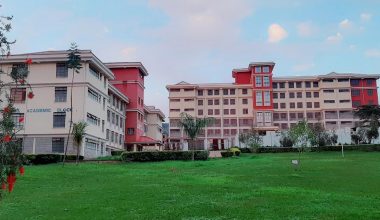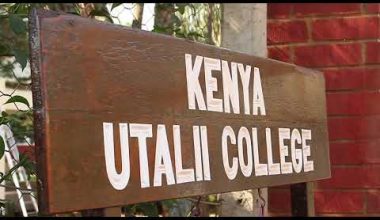Apart from academics, the University of Embu has provided opportunities for personal and professional growth. The campus is famous for its friendly atmosphere and supportive environment, which students create to help others enjoy university life.
The courses offered at the University of Embu, together with the somewhat friendly fee structure, are expected to be practically oriented.
This approach approaches the student’s preparedness to face challenges in the real world and helps the student contextualize his studies to real situations.
Embu offers an excellent opportunity for learners to learn, grow, and inspire change and to have a supportive and enjoyable university life.
In this post, we have outlined information on the courses offered, the University of Embu’s course fee structure, and its admission requirements.
Table of contents
- University of Embu
- Is the University of Embu a public or private university?
- What are the branches of University of Embu?
- University of Embu Courses
- University of Embu Fees
- University of Embu Requirements
- How to apply for a course in University of Embu?
- How many intakes are there in University of Embu?
- How much is University of Embu application fee?
- Am I Eligible to Join University of Embu with a C?
- Can I join University of Embu with a D+?
- FAQs
- Conclusion
- References
- Recommendations
University of Embu
The University of Embu was founded in 2011 as a University College and acquired full university status in 2013, hence becoming a fully-fledged public university. It is among the most recognizable universities in Embu County, Kenya.
It is among the most sought-after universities by students who pursue quality education in diverse fields. At the University of Embu, quality education is fostered, innovations are nurtured, and excellence is nurtured.
Is the University of Embu a public or private university?
The University of Embu is a public university; therefore, it’s stated that the Kenyan government funds in terms of finances and, at the same time, governs the said government to make the institution accessible to many students.
As a public university, the University of Embu’s interests include offering educational services at more reasonable rates for students of different backgrounds.
Public universities usually have cheaper tuition compared to private ones; their role is to serve the community and provide more opportunities to get higher education for more people.
Also see TVET Courses in Kenya | Requirements and Fees
What are the branches of University of Embu?
The University of Embu comprises several campuses and centres: the Main Campus, Njoro Campus, and Embu Town Campus, among others. Many centres are found within the University, including the Centre for Entrepreneurship and Innovation, the Center for Research and Innovation, and the Centre for Continuing Education.
University of Embu Courses
The University of Embu has various academic programs, which include courses tailored to suit the diverse needs of its students. The programs total over 50 Undergraduate and Postgraduate, Certificate, and Diploma courses.
In summary, the courses offered at the university are pegged on providing skills, knowledge, and values that ensure success in chosen careers. Some of the courses provided fall under the following faculties:
- School of Agriculture
- School of Business & Economics
- School of Education & Social Sciences
- Department of Education
- Department of Humanities
- School of Law
- School of Nursing
- School of Pure & Applied Sciences
- Centre for Climate Change Adaptation and Mitigation
Some of the popular courses at the University of Embu include:
School of Pure and Applied Sciences
Bachelor’s degree courses offered at the School of Pure and Applied Sciences are:
- BSc. in Biogeochemistry
- BSc. in Biology
- Bachelor of Science in Biochemistry
- BSc. in Microbiology and Biotechnology
- BSc. in Analytical Chemistry
- BSc. in Industrial Chemistry
- BSc. in Information Technology
- BSc. in Computer Science
- BSc. in Statistics
- BSc. in Physics Bachelor of Science (BSc.)
- BSc. in Environmental Conservation and Natural Resource
- BSc. in Environmental Sciences
Masters courses offered under this department are:
- MSc. in Genetics
- MSc. in Physics
- MSc. in Chemistry
- MSc. in Hydrobiology
- MSc. in Applied Microbiology
- MSc. in Statistics
- MSc. in Plant Ecology
- MSc. in Entomology
- Master of Science in Applied Parasitology
- Master of Science in Biology of Conservation
- MSc. in Applied Mathematics
- MSc. in Computer Science
- MSc. in Pure Mathematics
The School of Pure and Applied Sciences has many academic programmes, from PhDs to Certificates. Ph.D. courses offered include:
- PhD in Entomology
- PhD in Physics PhD in Genetics
- PhD in Plant Ecology
- PhD in Fisheries
- PhD in Chemistry
- Doctor of Philosophy in Applied Parasitology
- Doctor of Philosophy in Applied Microbiology
- Doctor of Philosophy in Biology of Conservation
School of Agriculture
The courses offered in the School of Agriculture range from PhDs to degrees and certificates.
PhD courses offered include:
- PhD in Management of Agro-ecosystems and Environment
- PhD in Agricultural Resource Management
- PhD in Crop Protection
- PhD in Genetics and Plant Breeding
- PhD in Agronomy
- PhD in Agricultural Economics
- PhD in Soil Science
- PhD in Horticulture
- PhD in Biotechnology
- PhD in Land and Water Management
- PhD in Agroforestry
Masters programmes:
- MSc. in Agronomy
- MSc. in Agroforestry
- MSc. in Agro Ecosystems Management
- MSc. in Land & Water Management
- MSc. in Crop Protection
- MSc. in Biotechnology and Plant Breeding
- MSc. in Range Management
- MSc. in Soil Science
- MSc. in Horticulture
- MSc. in Agricultural Resource Management
You can enrol for any of the following Bachelors courses:
- BSc. in Management of Agro-Ecosystems and Environment
- BSc. in Agriculture Education & Extension
- BSc. in Agriculture
- BSc. in Water Resource Management
- BSc. in Agricultural Economics
- BSc. in Range Management
- BSc. in Agribusiness Management
- BSc. in Horticulture
- BSc. in Agricultural Biotechnology
- BSc. in Animal Science and Production
A diploma in Crop Protection is also offered at the institution.
Aside from the single diploma programme, certificate courses are also offered.
They include a certificate in Farm Fertility Management, a Certificate in Seed Technology, a Certificate in Smallholder Irrigation and water Management, and a Certificate in Agribusiness Management.
School of Business and Economics
Postgraduate programs at the School of Business and Economics are a PhD in Business Administration and a Master of Business Administration. The School of Business and Economics also offers various Bachelor’s degrees.
- Bachelor of Commerce
- Bachelor of Economics
- Bachelor of Economics and Statistics
- Bachelor of Purchasing & Supplies Management
- Diploma in Purchasing & Supplies
- Bachelor of Science in Finance
The school offers a Certificate in Purchasing & Supplies. CPAs are also offered.
The sections taught at the university include: CPA Part 1, Section 1 & 2 CPA Part 2, Section 3 & 4 CPA Part 3, Section 5 & 6 The University of Embu also offers Accounting Technicians Diploma Level I, II & III.
School of Nursing
The School of Nursing has the following academic programmes.
- Bachelor of Science in Nursing (BScN) Upgrading Programme
- Bachelor of Science in Nursing (BScN) Direct Entry
- Bachelor of Science in Community Health & Development
The institution does not have diploma programmes in nursing.
The School of Education and Social Sciences offers only one PhD program,
- PhD in Educational Administration & Planning.
Here are some of the courses offered:
- Master of Education in Educational Administration & Planning
- Master of Education in Educational Foundations
- Master of Education in Curriculum Studies
- Master of Arts in Linguistics
- Master of Arts in Literature
- Master of Arts in Kiswahili
For a bachelors program, here are some of the available courses:
- B.Ed. Arts
- B.Ed. Science Bachelor of Library and Information Science
- Bachelor Criminology & Security Studies
Diploma courses at the university include: Diploma in Records and Archives Management Diploma in Library and Information Science.
Also see Courses offered at Open University of Kenya | 2025 Requirements
University of Embu Fees
The University of Embu has affordably organized its fee structure so that students from different income levels may find a place in the university.
The University of Embu tuition fee structure will change with the course pursued, mode of study, and category of student, where Kenyan government-sponsored student pays less tuition fee than self-sponsored students.
Other charges include registration fees, accommodation, and learning materials.
See the attachments to know the accurate details of University of Embu fees.
University of Embu Requirements
Admission to the University of Embu is open to applicants who meet the minimum admission requirements prescribed by KUCCPS and the University of Embu’s Senate.
Some of the general requirements are listed below:
Undergraduate courses: Mean grade C+ at KCSE or its equivalent with a minimum of C+ grade in relevant subjects. In addition, a candidate has to have a minimum of C- grade in Mathematics and English or Kiswahili.
Postgraduate courses: a bachelor’s degree from an accredited university with at least a cumulative of 3.0 GPA or Second Class Honors or its equivalent.
International students: a minimum GPA of 3.0, proficient in English.
Applicants are required to present the following besides meeting the academic entry qualifications that the University of Embu stipulates:
- Certified copies of academic certificates and transcripts
- National Identity Card or Passport
- Proof of payment of fees
How to apply for a course in University of Embu?
Application to the University of Embu Course Application starts with collecting important information about the courses offered and their admission requirements. This information is obtained from their website.
Applicants must first create an account on the portal using the university’s website and then access the portal to apply online.
Applicants create an account, log on, and start the application process. They then fill in the online application form, stating their personal details, academic qualifications, and course preferences.
This is where applicants will be required to attach all the necessary documents on the form: certified copies of academic certificates, national identity cards or passports, and one passport-sized photograph.
After completing the form, ensure you review all information for correctness of the details provided before submitting. Upon submission and confirmation, further instructions on subsequent steps, including interviews and additional documents needed, are mailed to you.
The application form has to be made online, and the applicant is expected to pay some non-refundable application fee.
How many intakes are there in University of Embu?
The University of Embu admits students three times a year: in January, May, and September.
The January intake is the main intake and is usually the most popular among the students. The May intake allows admission to enter the university in the middle of the year, while the September intake is for those students who join at the beginning of the second semester.
It also has a flexible intake system that enables students to take classes at any time in the year, based on their academic schedule and preferences.
Each intake gives ample opportunity for admission to hundreds of undergraduate and postgraduate programs.
Applicants will also find it handy to pay close attention to certain dates, which the university might have announced on its website concerning applications and admission because they vary with every new academic year.
Apart from this, the schedule for some short courses or special programs might vary, and thus, one has to keep updated regarding university notices.
Also read about Moringa School Courses and Fees | 2024 Requirements
How much is University of Embu application fee?
The current application fee charged while applying to the University of Embu is KES 1,000 for undergraduates and KES 2,000 for postgraduates. The application fee is non-refundable and must be paid while applying online.
The application fee is payable by M-pesa, bank transfer, or credit/debit card.
International students charge differently compared to the local students. To this end, it is best to verify with the university’s admission office for preciseness in the cost. By making the secure and immediate payment, it means that your application will not be delayed.
The application fee is always subject to variation; one is advised to always check from the university website or the admission office if there is an update concerning the application fee.
Keep the receipt for payment as proof that it may be required in subsequent admission procedures or inquiries.
Also see Courses offered at Open University of Kenya | 2025 Requirements
Am I Eligible to Join University of Embu with a C?
Yes, the University of Embu admits students with a minimum mean grade of C in the Kenya Certificate of Secondary Education (KCSE) in some programs.
Although a mean grade of C is a modest performance in Kenyan grading, it is equally considered a valid entry qualification used in the University of Embu for students looking to pursue some courses.
It must be noted that the University operates different programs. Each has varying entry requirements, with some having more elevated grade scores.
For instance, students who wish to pursue education, arts, or social sciences courses may be admitted with a mean grade of C, while science, technology, engineering, and mathematics students have to get a higher grade, usually B—and above.
Some courses are supposed to have special requirements a student must meet; these include certain subject combinations and aptitude tests.
Can I join University of Embu with a D+?
No, University of Embu does not admit students with a D+ mean grade in KCSE into any program.
D+ is considered low performance in the Kenyan education system; hence, the University of Embu set a higher admission threshold to admit only those who had shown a certain level of academic proficiency.
The University’s admission policy ensures the student has an adequate foundation in one area of specialization which may not be adequately developed with a D+ grade.
Although a D+ grade may not be acceptable for direct entry into University of Embu, students with such a grade can have other formula opportunities which may open avenues for higher education. Such avenues include bridging courses or diploma programs.
These, therefore, are students’ second chances to improve their grades and meet the requirements for entry into a degree program at the University of Embu or other institutions.
FAQs
Yes. Embu University offers a pharmacy
Nursing
Community Health
Public Health
Diploma in Business Information Technology
Conclusion
With relatively affordable fees and clear admission requirements, the University of Embu is considered a prospector of higher learning institutions in Kenya, especially in terms of courses.
This easily positions the university as an attractive option for students wanting to advance their education while being conscious of the financial burden that comes with this choice.
It has stood the test of time and remains focused on producing graduates who are properly equipped to face the challenges of the contemporary job market.
References
- embuni.ac.ke/fee structure
- tuko.co.ke/university embu courses






